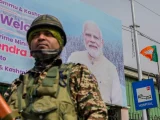
Forced Displacements and Land Grabs: India’s Settler Colonialism in IIOJK Revealed
November 2, 2024In Indian Illegally Occupied Jammu and Kashmir (IIOJK), a calculated campaign to seize land and force displacements has intensified. Under the pretext of “strategic needs,” the Indian Army has taken control of extensive tracts of land, forcing hundreds of families out of their homes. This land acquisition, which predominantly impacts Kashmiri Muslims, has been bolstered by recent legislative changes. These amendments grant India’s armed forces sweeping powers to claim any land deemed “strategic,” and reports indicate that over 53,000 hectares are now under military occupation.
Since 2021, an estimated 200 families have been forced to leave their homes, and over 50 houses have been demolished in a campaign that has shifted thousands from their lands. The Modi administration has also introduced a “land for the landless” scheme, through which plots have been allocated to around 9,000 people, a significant number of whom are reportedly non-Muslims from outside the region. This scheme, combined with other land allocations, has allowed the Indian government to settle non-Kashmiri Hindu residents in IIOJK, deepening local concerns that these policies aim to change the region’s demographic balance.
This development aligns with other large-scale land allotments, including nearly 20,000 Kanals granted to Hindu investors and over 200,000 acres earmarked for foreign interests, signaling a shift towards an outsider-oriented economic strategy in Kashmir. Security forces have acquired another 129 Kanals in Baramulla, and plans for a new housing complex for serving and retired army personnel in central Jammu are underway. The Indian Army Welfare Housing Organization (AWHO) is reportedly building housing for military families, mimicking settlement tactics akin to those used in Israel’s occupation of Palestinian territories.
The demographic shift extends beyond land and housing to include electoral politics. The government recently granted voting rights to non-Kashmiris who have lived in Jammu for at least one year. This change has introduced approximately 93,000 new non-local voters, with local verification now handled by visiting officials, which facilitates the electoral inclusion of people from other Indian states. Critics argue that these policies strategically aim to create a voter base sympathetic to the ruling BJP, which historically supports the Hindutva ideology.
India’s efforts to change the demographic character of Kashmir have drawn condemnation from international organizations. The United Nations Human Rights Council (UNHRC) and Amnesty International have openly criticized India’s human rights record in Kashmir. However, India has proceeded with these changes, undeterred by the international censure. For the Modi administration, integrating Kashmir within its larger vision of a Hindu-majority nation is seen as a solution to the long-standing Kashmir conflict. This approach has also led to the annulment of Jammu and Kashmir’s special status, stripping the region of autonomy.
Human rights advocates argue that these policies, which systematically target the fundamental rights of Kashmiri Muslims, reveal a clear intent to alter the region’s identity, culture, and political landscape. For Kashmiris, these new laws and policies represent a deliberate imposition of an ideology that contradicts the distinct cultural identity of the region. India’s approach has been criticized as settler colonialism, with analysts warning that by reshaping the demographics of IIOJK, India is not only altering the political future of Kashmir but also eroding its cultural and social heritage. The forced evictions, land grabs, and demographic engineering in IIOJK constitute a wide-reaching policy that, while aligning with the BJP’s vision of a unified Hindu nation, strips Kashmir of its uniqueness and autonomy. As India continues this path, international observers are calling for accountability to preserve the identity and rights of Kashmiris, in line with the international legal norms India has committed to uphold.

